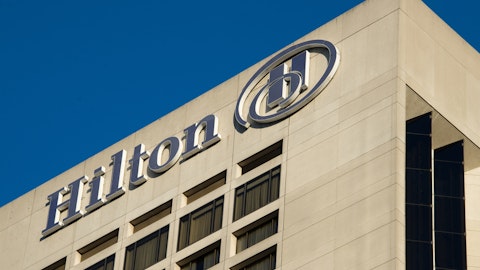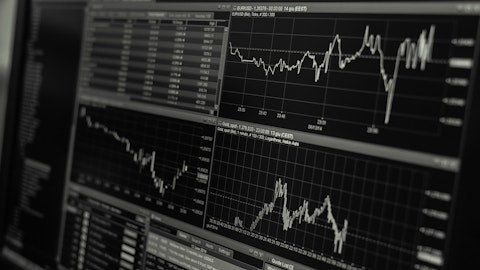In this article, we discuss the long-term returns of Bill Ackman’s activist targets. You can skip our detailed analysis of Ackman’s activist targets and their historical performance and go directly to read Long-Term Returns of Bill Ackman’s 5 Activist Targets.
Bill Ackman is a popular figure when it comes to activist investments. Pershing Square founder and CEO is best known for his aggressive campaigns designed to unlock and maximize shareholder value in undervalued stocks. Whether it is seeking board seats, pushing for mergers and acquisitions, or pushing for spin-offs, the hedge fund manager often seems to find his way into companies he invests in.
Ackman is best known for his activist campaigns focusing on highly undervalued companies with tremendous potential. It all started with an investment in Wendy’s in 2004, whereby he took a significant stake in the fast food chain and pressured management to spin off its Tim Horton’s brand. His proxy battle would result in a substantial profit once he exited the position.
However, it is not always rosy for Ackman, despite being one of the most prolific hedge fund managers. His biggest miss has to be his conviction for a $1 billion short position on the health supplement company Herbalife. His argument that the company was a pyramid scheme would put him at a crossroads with another ferocious activist investor, Carl Icahn. He exited the position in 2018, insisting that the capital could be better deployed in other better opportunities.

In recent years, Ackman has clarified that he is no longer interested in vocal short-selling campaigns. The decision comes from the investment strategy generating media attention for Pershing Square Capital Management.
“Fortunately for all of us, and as importantly for our reputation as a supportive constructive owner, we have permanently retired from this line of work.” Ackman said.
As part of the quieter investment strategy, Ackman has taken stakes in Netflix, Inc. (NASDAQ:NFLX) and more recently built a position in Canadian Pacific Railway Limited (NYSE:CP).
Our Methodology
Ackman has clarified that he is retiring from the vocal activist life. Even as he works behind the scenes with management and adopts a quitter approach to investments, his previous activist work still speaks for itself.
We have compiled a list of some of his most prominent activist plays on Wall Street and the returns the plays have generated.
Long-Term Returns of Bill Ackman’s Activist Targets
12. Alexander & Baldwin, Inc. (NYSE:ALEX)
Activist Investment: 2011
Long Term Returns Since Ackman’s Investment: 47.02%
S&P 500 Gain Since Ackman’s Investment: 1.82%
Alexander & Baldwin, Inc. (NYSE:ALEX) is a real estate investment trust that focuses on Hawaii commercial real estate and is the largest owner of grocery-anchored neighborhood shopping centers. It owns and operates about 3.9 million square feet of commercial space in Hawaii. Ackman bought a 9.9% stake in the company in 2011.
With the investment, the activist investor started discussions with management and the board concerning business assets, capitalization, and financial conditions operations. Ackman also considered splitting the business as one of the ways of maximizing shareholder value.
Ackman would exit his position in 2013, having failed to launch a serious activist campaign against Alexander & Baldwin, Inc. (NYSE:ALEX). Nevertheless, he had racked up significant returns, outperforming the S&P 500.
11. Fortune Brands Innovations, Inc. (NYSE:FBIN)
Activist Investment: 2011
Long Term Returns Since Ackman’s Investment: 64%
S&P 500 Gain Since Ackman’s Investment: 29%
Fortune Brands Innovations, Inc. (NYSE:FBIN) is a company that provides home and security products for residential home repair, remodeling, and new construction and security applications. The company was first targeted by Ackman in 2011 as the activist investor remained confident of the company outperforming as the housing market rebounded from the financial crisis.
A company stock run-up began as investors believed the activist investor would deliver and turn around the company’s fortunes. With the activist investor on board, Fortune Brands Innovations, Inc. (NYSE:FBIN) announced it would break up into two as part of a strategic review.
By the time he exited his position in 2012, he had amassed a profit of about $300 million in the stock.
10. Canadian Pacific Railway Limited (NYSE:CP)
Activist Investment: 2011
Long Term Returns Since Ackman’s Investment: 153.3%
S&P 500 Gain Since Ackman’s Investment: 70.13%
Canadian Pacific Railway Limited (NYSE:CP) operates a transcontinental freight railway with its subsidiaries in Canada and the US. It transports bulk commodities, including grain coal, Potash fertilizers, and Sulphur. Pershing Square Capital Management first began purchasing stakes in the company in 2011.
The activist investor began a hostile maneuver of the company that involved pushing for management changes. Canadian Pacific Railway Limited (NYSE:CP) bowed to pressure and agreed to hand Ackman board seats as it sought to ease tensions with one of its biggest investors.
Pershing Square exited its position in 2016, having netted a profit of $2.6 billion. Ackman stepped down from the board and paid tribute to the management he helped install after agitating for changes. The exit came after Canadian Pacific Railway Limited (NYSE:CP) failed to merge with Norfolk Southern.
9. Federal Home Loan Mortgage Corporation (NYSE:FMCC)
Activist Investment: 2013
Long Term Returns Since Ackman’s Investment: 80.67%
S&P 500 Gain Since Ackman’s Investment: 4.12%
Federal Home Loan Mortgage Corporation (NYSE:FMCC) operates in the secondary mortgage market and is tasked with purchasing single and multi-family residential mortgage loans originated by lenders. Mortgage loans and mortgage-related securities are part of its investment portfolio.
Ackman invested nearly half a billion dollars in the company in 2013 for a 10% stake. Following the investment, the activist investor said he might engage in discussions with management board and other stockholders involved in Federal Home Loan Mortgage Corporation (NYSE:FMCC) .
In 2014, Ackman sued the US government over its company bailout, alleging that the Department of Treasury had seized tens of billions of dollars in profits. The largest shareholder also insisted that it had been told stockholders no longer held fundamental shareholders rights.
8. Air Products and Chemicals, Inc. (NYSE:APD)
Activist Investment: 2013
Long Term Returns Since Ackman’s Investment: 53%
S&P 500 Gain Since Ackman’s Investment: 42%
Air Products and Chemicals, Inc. (NYSE:APD) is a company that specializes in the provision of atmospheric gasses, processes, and specialty gases. It produces atmospheric gases, including oxygen, nitrogen, and argon. Pershing Square first disclosed a 9.8% stake in the industrial gas maker in 2013, valued at about $2.2 billion.
The activist investor became the biggest shareholder of Air Products, prompting Air Products and Chemicals, Inc. (NYSE:APD) to adopt a poison pill to avert a takeover. With the investment, Ackman reiterated that the company was highly undervalued and an attractive investment.
7. Platform Specialty Products
Activist Investment: 2014
Long Term Returns Since Ackman’s Investment: 3%
S&P 500 Gain Since Ackman’s Investment: 64%%
Founded in 2013, Platform Specialty Products was a company formed to buy specialty chemicals before it changed its name to Element Solutions Inc (NYSE:ESI). Ackman first bought stakes in the company in 2014, insisting the company was highly undervalued with the potential to generate significant returns.
Ackman spearheaded a string of changes in the company’s board and management. In 2015, he was handed two seats on the board. The company also appointed Rakesh Sachdev as the new CEO, replacing the outgoing Daniel Leever.
In addition to management changes, the company agreed to spin off its agriculture solutions and performance segment into two independent traded companies. Ackman exited his position in 2019.
6. Zoetis Inc. (NYSE:ZTS)
Activist Investment: 2014
Long Term Returns Since Ackman’s Investment: 26.45%
S&P 500 Gain Since Ackman’s Investment: 4.50%
Zoetis Inc. (NYSE:ZTS) is engaged in the design, development, manufacturing, and commercialization of medications, vaccines, and diagnostic products for animal health. It commercializes products across species, including livestock, such as cattle, swine, poultry, fish, sheep, etc.
Pershing Square took an 8.5% stake in the company in 2014, valued at $1.54 billion. Under a standstill agreement, the activist investor took a seat on the board and started agitating for a shakeup of the company spun out of Pfizer in 2013.
Ackman wanted Zoetis Inc. (NYSE:ZTS) to consider slashing costs and improving shareholder returns. There was also an indication that the investor wished to management to consider the potential sale of the business if it did not make progress. Bayer and Novartis had shown interest in the company.
With Ackman pilling pressure, Zoetis Inc. (NYSE:ZTS) management eliminated 5,000 underperforming SKUs and exited 10 manufacturing plans. Additionally, the company reduced its workforce by 165 employees and redirected its research and development endeavors towards projects with a greater potential for generating significant returns. As part of a profit-taking spree, the activist investor started slashing stakes in the company in 2016.
Click to continue reading and see Long-Term Returns of Bill Ackman’s 5 Activist Targets.
Suggested articles:
- Goldman Sachs Growth Stocks: Top 12 Stocks
- List of 55 Artificial Intelligence Companies in USA
- Goldman Sachs EV and Battery Stocks: Top 10 Stock Picks
Disclosure: None. Long-Term Returns of Bill Ackman’s Activist Targets is originally published on Insider Monkey.





